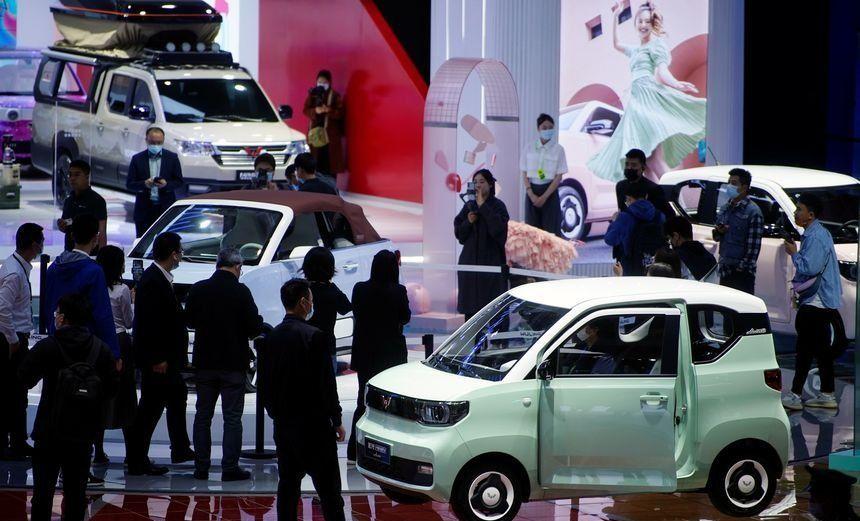
The Hongguang Mini is the number one electric vehicle model sold in the Chinese market in 2021.
Image credit: ALY SONG/REUTERS
Yang Jie
18 January 2022 CST updated at 07:35
A less expensive battery technology championed by Tesla Inc. (TSLA) head Elon Musk dominated China, the world's largest auto market, last year, suggesting challenges for Tesla's U.S. and European rivals.
Official Chinese data show that in 2021, the proportion of battery production using lithium iron phosphate (LFP) technology in China's total power battery production rose to 57% from less than half the previous year.
LFP batteries have taken the lead in the Chinese market because they use relatively inexpensive iron instead of metals such as nickel, which are more expensive, at the cathode.
The rise of LFP batteries coincides with the emergence of electric vehicles as a mass commodity in China. In 2021, sales of new energy vehicles (mainly electric vehicles) will account for nearly one-sixth of the total sales of passenger cars in the Chinese market. In terms of sales volume, China is the world's largest automotive market.
In the context of the increase in the number of electric vehicles sold by Chinese car dealers and the proportion of electric vehicles equipped with LFP batteries, LFP battery production has surged. The China Automotive Battery Research Institute said that in 2021, the output of LFP batteries produced by Chinese battery manufacturers was 125.4GWh, more than three times that of the previous year.
Car companies in the United States and Europe have historically been less optimistic about LFP batteries because the energy density of such batteries is often lower than that of nickel-based batteries, which means that cars powered by LFP batteries have a shorter range after a single charge. And LFP batteries are more likely to have poor performance problems in cold weather conditions.
Over the past 20 years, Chinese companies have tried to catch up with Japan and the United States in battery technology, with a focus on improving LFP technology, not only because of the cost issue, but also because LFP batteries have a lower risk of ignition. China's previous subsidies for the electric vehicle industry have been biased to support long-range vehicles, but today's policy changes have also helped LFP technology gain an advantage.
Vigorously developing electric vehicles is an important effort for the world to get rid of dependence on oil and natural gas, lithium as a key raw material for electric vehicle batteries, its market demand continues to grow, and the price rises accordingly. But mining lithium mines requires a lot of water, and the production of battery-grade lithium compounds is also potentially harmful to the environment, so lithium mine projects have frequently sparked protests. Investors are concerned that the supply of lithium will not be able to meet demand in the coming years. Cover image credit: STR/Getty Images, Oliver Bunic/AFP/Getty Images WSJ S Chinese
Musk, one of the strongest advocates of LFP technology, has said that getting enough nickel at a reasonable cost is a major problem in the production process. He countered the claim that customers who bought LFP cars were getting secondary products.
Musk tweeted to a customer in August last year: "We strive to make nickel-based and iron-based batteries bring about roughly the same product experience." According to Tesla's plan, if the customer chooses LFP batteries, he can withdraw Tesla cars in advance.
Musk posted on Twitter: "I personally would be slightly inclined to iron-based batteries, because this kind of battery can be charged to full, and nickel batteries are best charged to about 90%. ”
Automakers in the U.S., Europe and Japan are stepping up battery production, and many are working on LFP technology, but they are generally inferior to Tesla and Chinese producers in applying the technology to large-scale market production.
Last October, Tesla said it would expand the use of iron-based batteries to all of its standard-mileage cars.
Image credit: SHELDON COOPER/ZUMA PRESS
Tesla will use LFP batteries for the first time in 2020 for the Model 3 made in China. The company said in October that it would expand the use of such iron-based batteries to all of Tesla's standard series. China's Contemporary Amperex Technology Ltd (300750.SZ) provides LFP batteries for Tesla. CATL is the world's largest manufacturer of electric vehicle batteries.
Other Chinese electric vehicle brands are also using LFP batteries in large quantities. The Hongguang MINI, a small hatchback starting at just $4,400, is China's best-selling electric vehicle in 2021. The car is produced by General Motors Co. (GM) in a joint venture with two other Chinese companies.
WARREN Buffett's investment in BYD Co. (BYD Co., 1211.HK) produces both electric and electric batteries. BYD has designed a blade-shaped LFP battery. BYD said it designed batteries with higher energy density that extend the range of electric vehicles.
According to BYD's social media accounts, he Long, the company's vice president, said when announcing the battery last year that almost all the car brands you can think of are discussing cooperation with us based on blade battery technology.